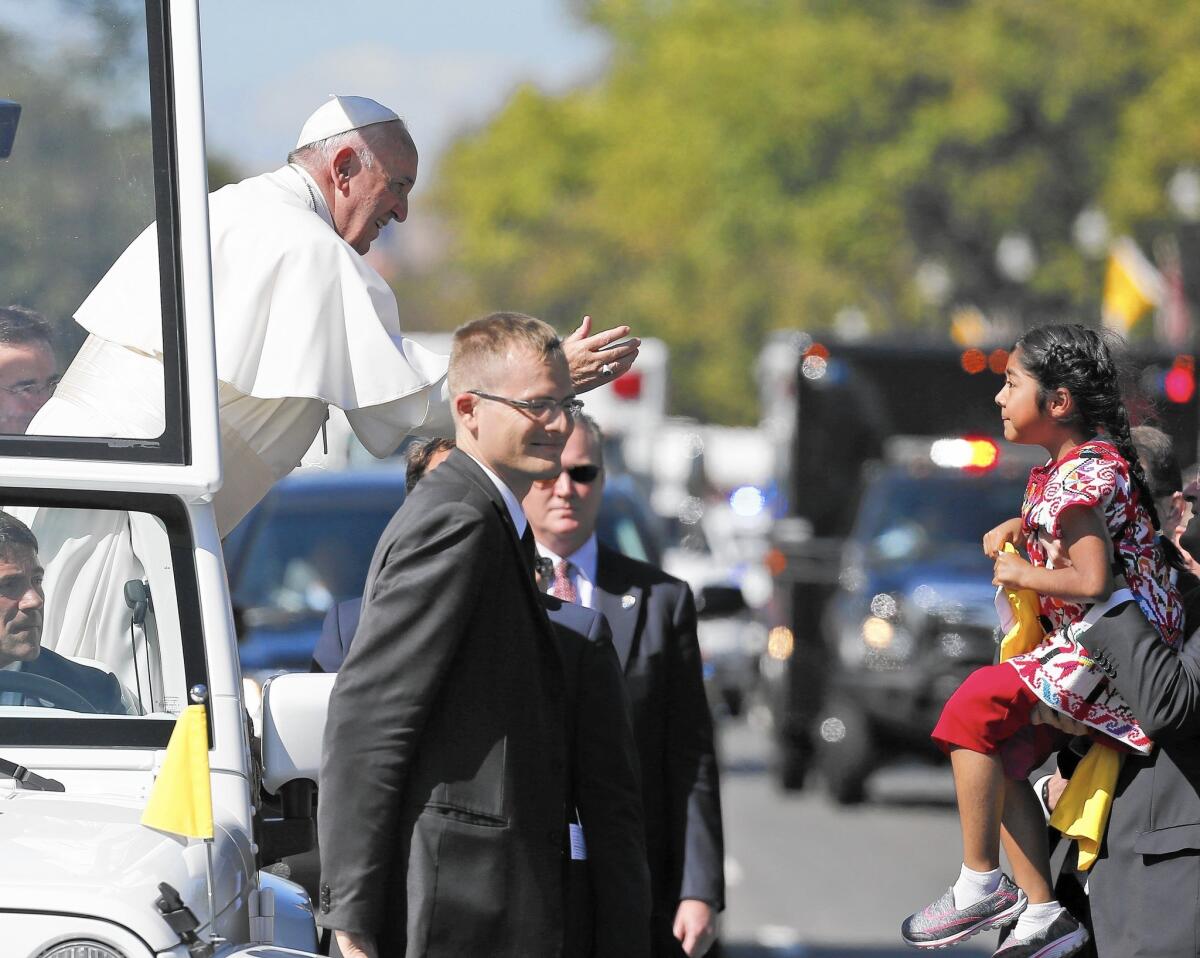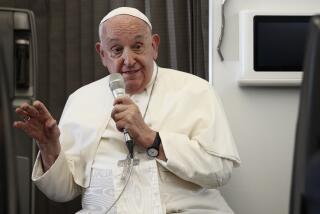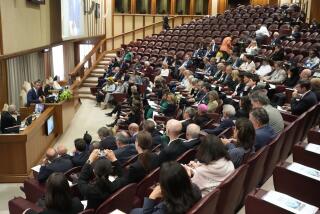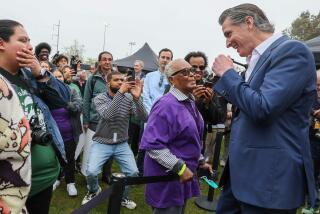Pope Francis opens visit with message for both sides of U.S. political divide: Save our planet

Pope Francis reaches for a letter and a gift from Sophie Cruz, 5, of suburban Los Angeles, as he makes his way through Washington.
Reporting from WASHINGTON — He spoke in halting English, sometimes a whisper, pressing his flock to be stewards of the Earth — a familiar Catholic homily delivered with the bearing of a humble parish priest.
In place of the faithful, though, were dress Marines, a color guard, trumpeters and a chorale, and the leader of the free world, assembled in front of 11,000 people outside the White House.
Pope Francis opened his unprecedented conversation with the United States on Wednesday by contrasting the pomp of his Washington welcome with a message conveyed in a pastor’s gentle tone: The time has come to preserve the planet.
“Climate change is a problem which can no longer be left to our future generation,” Francis told the crowd gathered on the South Lawn of the White House in an unusually large ceremony for a foreign dignitary. “When it comes to the care of our common home, we are living at a critical moment of history. We still have time to make the change needed to bring about a sustainable and integral development, for we know that things can change.”
The opening tableau of his six-day visit to the U.S. showed Francis in all his paradoxical glory — the church patriarch with the demeanor of a lowly pastor who also possesses an ambitious drive to influence world leaders. Proving his political savvy, Francis’ quieter presence was a novelty amid a political climate defined by overheated rhetoric, and it even overshadowed President Obama’s lengthier introduction in his now-familiar dramatic oratory.
On Thursday, Francis will take his message on the moral imperatives of global warming to Capitol Hill, where both sides of Washington’s partisan divide, out of respect either for his papacy or his worldwide star power, will be listening.
In his first public words here, Francis drew on the universal appeal he has built during his papacy to remind listeners that he will not be categorized neatly as liberal or conservative.
He introduced himself as “the son of an immigrant family” and as a “guest of this country, which was largely built by such families,” and referred warmly to his collaboration in Obama’s efforts to reopen ties with Cuba.
He called for a society that is “truly tolerant and inclusive” and rejects unjust discrimination — phrases with resonance for the political left in the U.S.
Francis countered those remarks with reassuring words for religious conservatives. He spoke not only of the importance of “safeguarding the rights of individuals and communities,” but also of building a society that respects “rights to religious liberty.”
And with Obama, a supporter of gay marriage, just a few feet away, Francis alluded to his belief in traditional unions, saying he supported “the institutions of marriage and the family at this, a critical moment in the history of our civilization.”
The pope’s comments suggested he was well aware that his impartiality would be crucial to his ability to persuade, especially before Thursday’s joint session of Congress.
“I hope, as a brother of this country, to offer words of encouragement to those called to guide the nation’s political future in fidelity to its founding principles,” the Argentine-born pope said.
House Speaker John A. Boehner of Ohio, a Roman Catholic Republican, knows he invited a pontiff who presents a challenge to members of his chamber.
Congressional leaders have nudged their colleagues to maintain decorum and to leave aside the camera-conscious ovations in which lawmakers jump to their feet or sit on their hands during presidential addresses in the chamber.
“The best thing we can all do is listen, open our hearts to his message and reflect on his example,” Boehner said.
Still, some in Congress clearly hope the pope will not limit himself simply to preaching to them during the first-ever papal address to Congress.
“There are also some things we hope that he can take away from visiting our country for the first time,” said GOP Sen. John Thune of South Dakota, calling the American free-enterprise system “the greatest anti-poverty force that the world has ever seen.”
Many scholars question why the pope’s visit is being viewed so consistently through a political lens, inescapable as that is in Washington.
“His visit and message are both prophetic and pastoral,” said Richard Garnett, a University of Notre Dame law professor. “His challenge, to all of us, is to allow ourselves to be challenged by Christianity.”
The Vatican, a two-millennium-old institution, tends to issue pronouncements of a relatively timeless nature. Francis, though, seems astutely aware of his context. The nature of American politics makes it impossible to make purely pastoral statements, said Robert J. Guttman, director of the Center for Politics and Foreign Relations at George Mason University.
“If this wasn’t a presidential campaign year, this wouldn’t look so political. But it is, and it did sound political,” he said.
Context is everything, Guttman said.
Francis “may be speaking in religious terms,” he said. “But all these things become political issues.”
Whatever the pope chooses to do or say, his popularity — 90% approval among American Catholics and 70% among Americans as a whole — means the political crowd still affords him plenty of deference.
The White House dispensed with a 21-gun salute in consultation with the Vatican. And although the slow-moving 78-year-old pontiff arrived a quarter of an hour late for his welcome at the White House, no one made a fuss.
Press Secretary Josh Earnest said he couldn’t remember such a delay, but he quickly added, “It is not significantly inconvenient to the president’s schedule at all today.”
More to Read
Sign up for Essential California
The most important California stories and recommendations in your inbox every morning.
You may occasionally receive promotional content from the Los Angeles Times.













